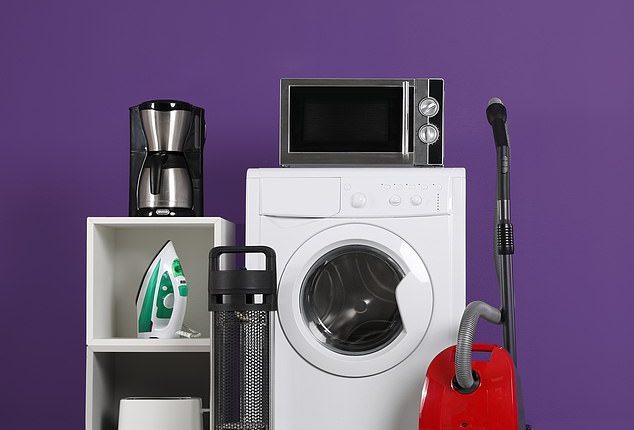Scientists have issued a warning about home washing machines after finding the appliances fail to kill dangerous, treatment-resistant pathogens.
The new study found that up to half of at-home washing machines cannot sufficiently sterilize healthcare workers’ uniforms to effectively protect against the spread of infection.
Researchers cited this as a serious risk for the 22 million Americans working in hospitals and other healthcare settings, as well as their families.
Hospital-acquired infections are a major public health concern because they frequently involve antibiotic-resistant bacteria such as those that cause colon inflammation, boil-like skin rashes and pneumonia.
Many of these infections can quickly turn deadly as many have a mortality rate between 20 and 50 percent.
The researchers evaluated six models of home washing machines based on how well they disinfected healthcare worker uniforms, while also looking at various wash cycles and detergent conditions.
They also investigated whether the bacteria became tolerant to detergent, and whether this also made them more resistant to antibiotics.
The team found that half of the machines did not decontaminate the uniforms during a rapid cycle, while one-third failed to do so with a standard cycle.
The study’s findings suggested that nurses and doctors who wash their scrubs at home in standard washing machines are not fully decontaminating them, and previous studies have shown that bacteria can spread through clothing.

A new study found that home washing machines fail to kill dangerous, treatment-resistant pathogens that cling to healthcare workers’ scrubs
The team, led by UK’s De Montfort University, also found bacterial residue lingering in the machines, as well as traces of antibiotic-resistant genes.
And to make matters worse, the investigation confirmed that bacteria can become resistant to detergent, and this increases their resistance to certain antibiotics.
‘Our research shows that domestic washing machines often fail to disinfect textiles, allowing antibiotic-resistant bacteria to survive,’ researchers said in a statement.
‘If we’re serious about transmission of infectious disease via textiles and tackling antimicrobial resistance, we must rethink how we launder what our healthcare workers wear,’ they said.
The study, led by microbiology professor Katie Laird, used fabric swatches contaminated with Enterococcus faecium bacteria to test the decontamination capabilities of six household washing machines.
This type of bacteria can infect humans without needing a partner to reproduce, and it can cause serious illnesses like meningitis in newborns or infections in the heart.
The swatches were sealed in a bacteria-impermeable membrane, which allowed researchers to handle them without risking infection and prevented the microbes from spreading.
They then washed the swatches in 140°F water. According to the UK’s National Health Service (NHS), a 10-minute wash at this temperature ‘is sufficient to remove almost all micro-organisms’ from healthcare uniforms.

This research highlights a serious risk for the 22 million Americans working in hospitals and other healthcare settings, as well as their families
They also tested the effectiveness of biological and non-biological detergents.
Biological detergent contains enzymes which help break down the dirt, sweat and other substances that build up in your clothes, whereas non-biological detergent does not.
After washing, the researchers placed the swatches in a special broth that allowed any bacteria still clinging to them to grow.
They found that only half of the machines disinfected the swatches during a rapid cycle, and two-thirds did so during a normal cycle.
What’s more, none of the machines actually reached 140°F. Five of them got close during normal wash cycles, reaching 134°F to 136°F and maintaining those temperatures for five to 39 minutes.
Four out of those five effectively disinfected the swatches, killing 99.999 percent of the bacteria.
But one machine completely failed to reduce the bacteria during the normal cycle, and only reached a maximum temperature of 68°F.
During rapid wash cycles, three out of six machines did not get hot enough (only reaching 66°F to 111°F) or sufficiently kill the bacteria.

Hospital-acquired infections are a major public health concern because they frequently involve antibiotic-resistant bacteria such as Pseudomonas aeruginosa bacterium (pictured) which can infect the lungs, blood, skin and other parts of the body
The other three were successful and came just short of reaching 140°F. One proved to be more effective with non-biological detergent than biological.
The researchers also sampled biofilms (bacterial residue) from inside 12 different washing machines and found parthenogenetic bacteria lurking inside all of them.
In many cases, harmful, sometimes antibiotic-resistant bacteria such as Acinetobacter, Pseudomonas and Mycobacterium (which can cause serious illnesses such as tuberculosis and leprosy) made up a significant portion of the samples.
Antibiotic-resistant genes were also found in every sample, and further investigation showed that as some bacteria become more tolerant of detergent, they also become more tolerant of certain antibiotics.
The researchers published their findings in the journal PLOS ONE .
Altogether, these findings suggest that home washing machines may be insufficient for decontaminating healthcare worker uniforms, and could contribute to the spread of certain infections and antibiotic resistance, the team concluded.
They proposed updating the laundering guidelines given to healthcare workers, and urged healthcare facilities to provide on-site industrial washing machines for their employees to prevent potentially life-threatening infections.







